Last week an article came out in JAMA Pediatrics that got a lot of media attention. The basis of the article was looking at the long-term effects of sleep “problems” in toddlers. Let it be known now that there is a dearth of research on this topic. When many people jump up and down about how bad sleep habits in the younger years will result in lifelong problems, they have had only research from childhood to back them up. Yes, sleep problems at 5 years of age often persist and are associated with other behavioural problems. So this research is actually something that is needed.
The study itself was conducted in Norway using population-level cohort data, meaning there’s a lot of data (32,662 children, to be exact) and the study examined how sleep at 18 months influenced emotional and behavioural problems at 18 months and 5 years of age. What they found was that shorter sleep duration (≤ 10 hours in a 24 hour period) or regular nightly wakings (≥ 2 per night) were associated with increased risk of concurrent and later social and emotional problems.
Now, I know that most people would like to see that the methods were flawed and that we can’t take anything seriously from this study (much like Price and colleagues’s piece on longterm outcomes associated with sleep training). I won’t be doing this for two reasons: (1) The methods are quite sound for large, cohort data (which does have its own limitations that I will address); and (2) I don’t think it’s necessary as the data doesn’t speak to need to sleep train or not nurse to sleep or anything of the sort. What I’d like to do here is actually address the issue of what we can take from this research as the media, again, seems to have gotten it so very, very wrong.
What DOES the research suggest?
The research here found moderate increased risk for internalizing and externalizing behaviours (as reported by parents) at 5 years of age based on short sleep duration and night wakings at 18 months of age. The authors did control for baseline behaviours at 18 months and other family covariates (such as socio-economic status) suggesting that the findings are not solely due to the same behaviours manifesting across time. This means that there does seem to be an increased risk of problems associated with sleep at the toddler age.
What are the limitations to the research?
First and foremost, the research is cohort data and therefore we cannot assume causation. This is especially true in this case as the study did not include possible 3rd variables that might account for both sleep “problems” and behavioural problems, such as health problems, family conflict, and so on.
Second, when the authors did include the covariates, including the behaviours at 18 months, the strength of the relationship weakened, though remained significant. The weakening of the relationship actually suggests that there may be what researchers call “residual confounding” which means that the measure of behavioural problems at 18 months and the other covariates, such as SES, may STILL account for more variance than is being shown herein. The reason being that our measures of these variables are imperfect and thus we may be failing to capture all of the information on these constructs we need. This is more prevalent in cohort data as the measures used to assess these confounding variables are often more limited (e.g., a few questions) in order to reach a larger group of people; that is, the measures used are not as complete as ones used with smaller samples. Note that this is different than the third variable problem in that the argument stands that these variables are being controlled for, but possibly not completely. (For your own information, when one controls for variables and the relationship increases, it is much less likely that you will have residual confounding.)
Finally, the data was parent-report. This is very normal with this type of data and not a limitation by the researchers at all, but rather the method. The notion of wakings in particular will be influenced by other factors such as where the child sleeps and whether or not the child is still nursing. A nursing child is more likely to wake at night for a nurse than one who isn’t, but this is likely not associated with behavioural problems. Additionally, a child who sleeps with mom and nurses may be able to nurse without truly waking whereas a child in their own room will likely wake fully. These are factors that were not included herein.
Media reports have claimed that this supports extinction sleep training. Does it?
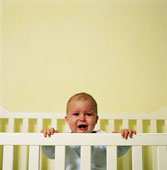 Not in the least. Extinction sleep training presupposes that the only consideration we must have is to do with sleep and not psychological well-being. As the editorial associated with this particular study was clear on, we have no idea which direction this relationship is going and most likely it is bidirectional.
Not in the least. Extinction sleep training presupposes that the only consideration we must have is to do with sleep and not psychological well-being. As the editorial associated with this particular study was clear on, we have no idea which direction this relationship is going and most likely it is bidirectional.
What does this mean? It means that behavioural problems may cause sleep problems which then exacerbate the behavioural problems. It also means that other factors can influence both problems. For example, a child who is growing up in a home where there is a lot of conflict is likely to act out as well. The child is also likely to suffer poor sleep from things like anxiety or shouting that may be ongoing. This poor sleep is likely going to cause further behavioural problems as well all know that we do get cranky and “off” when we don’t sleep well, especially when this is a repeating pattern.
However, would extinction sleep training help this child? Not at all because the underlying problem is not really sleep, it’s the environment and sleep training won’t change that. In fact, it may even make things worse if the child feels abandoned by his caregivers during this time which adds to his anxiety and thus likely increases his internalizing problems.
It’s not just things like family conflict that can result in both behavioural and sleep problems, but health problems (e.g., undiagnosed food sensitivities or allergies), breastfeeding problems (especially early on), separation anxiety, pain (e.g., teething, especially molar teething), and more can cause both. Extinction sleep training addresses none of the issues and focuses solely on sleep as the cause. Any good intervention would need to search out and address the underlying causes.
Another aspect that belies this is that in this group, a tiny percentage of toddlers feel into the at-risk group. Only 1.7% of toddlers had less than 10 hours sleep per night and only 3.2% woke 3 or more times. Now, we have no way of knowing if families used sleep training earlier on, though as the cohort was Norwegian, I would suspect it’s not likely. Why? Well, it’s a Scandinavian country which means that parents have access to wonderful leave options and Scandinavians tend to be more of the mindset that you do what helps babies, instead of imposing yourself on them. There may very well be a lot of gentle sleep guidance going on, but extinction sleep training? I struggle to believe that could explain the results.
Media reports also claim that it’s not good to create “bad habits” like nursing to sleep or rocking to sleep. How does that fit with this research?
I know certain media outlets have spoken to certain “experts” who say that these behaviours lead to long-term sleep problems, but the fact is that there is zero evidence of this. Many of the arguments stem from the idea that children will become dependent on these measures to fall asleep, but this ignores (a) that children also develop and with that development end up doing this in their own time, and (b) that if this does become a problem for the family later, there are gentle means to change these habits if they are not reflective of another underlying need.
The funny thing is, many families engage in these “bad habits” in order to help their child sleep and if we’re concerned about our children getting good sleep, shouldn’t we be doing what we can to help that? That includes nursing to sleep as it’s been found to assist with sleep in infants (see here for a larger discussion). Concerns over night wakings often centre on the fact that babies wake up and expect to be in the same environment that they went to sleep in. If they lightly rouse and see they aren’t in the same place, they will often fully wake up whereas if they are in the same, they will likely drift off back to sleep (if they aren’t hungry or need a diaper change or so on).
As such, things like co-sleeping and nursing on demand (“bad habits”) are actually conducive to good sleep. Our children, nestled in at the breast, are quite happy to rouse there, perhaps nurse, and return to sleep. In fact, as I mentioned in the extinction sleep training question, I actually believe many of these families in the cohort likely engaged in some of these so-called “bad habits” in order to facilitate sleep (with breastfeeding rates being as high as they are in Norway in the early months, it wouldn’t be too surprising).
If such a small percentage of children are waking at 18 months, they can’t be breastfeeding can they?
You would actually be correct. Although Norway has increased its breastfeeding rates from its lows in the 1970s to 85-90% breastfeeding at 3 months, post-one-year, the rates drastically decline and are at around 10% at 18 months. (Although I imagine these will continue to rise as Norway has policies that support breastfeeding like implementation of the WHO code on formula advertising, and employers having to offer 1 – 1 ½ hour breaks for moms to return home to nurse after their year’s maternity leave.)
Because the rates tend to be lower at the 18-month mark, it is not surprising that fewer families are seeing the higher number of wakings (though I wouldn’t expect this to influence total sleep duration). However, this may also speak to the definition of “wakings”. I know I personally would not have said my daughter “woke” more than 3 times a night at 18 months though she certainly nursed more than that. The difference is that she would still do “dream feeds” or the very bare arousal to latch then nurse and fall off again, still sleeping. It’s not clear how many mothers would have used the same definition as I did thus muddying the waters when it comes to breastfeeding and night wakings.
What about bedsharing or co-sleeping? How does that play into things here?
Interestingly, the same authors are the ones who reported that the National Cohort Data found that bedsharing at six months predicted greater night wakings at 18 months. I’ve discussed this other piece of research here and you should read up on it. Notably, again, the issue of the third variable problem comes to play in the older research as the failure to assess or report on sleep locations at 18 months means we have no idea if breastfeeding is the missing link. In this research, we don’t know what the bedsharing situation is. We know from the earlier data that there was a large relationship between bedsharing and breastfeeding at 6 months and it would not surprise me if this relationship held at 18 months as well.
Does this mean that bedsharing might cause problems at 5 years of age? After all, if bedsharing at 6 months predicted lots of night wakings at 18 months and night wakings at 18 months predict behaviour problems at 5 years of age, isn’t this logical? No. In fact, there is a wealth of research on bedsharing in infancy and beyond infancy that has found no long-term problems associated with it (see here for my summary of bedsharing beyond infancy), so relax and keep bedsharing safely if that’s what you’re doing.
With the particular data at hand, first there is the issue that prediction isn’t 100%. In each case, it’s an increased risk which means that the actual group is made up of all sorts of families, but there is a higher prevalence of those who were previously in the bedsharing group. So although there’s a higher risk associated with bedsharing, that does not mean if you bedshare you have problems down the line. Furthermore, the children in the bedsharing at 6 months group who end up in the night wakings at 18 months group may not be the children in the 18 month group who have behavioural problems at 5 years.
The second, and more important issue, is what the earlier research ignored and may very well be playing a role herein: the effect of reactional bedsharing. In Norway, bedsharing in general isn’t very common (although the prevalence of regular bedsharing in the younger sample was around 26% but was highly stratified by breastfeeding) and thus it’s likely that for those who do it there is another reason. Breastfeeding is one logical reason, but what of those who aren’t breastfeeding? Well, reactional bedsharing refers not to intentional or planned bedsharing but rather bedsharing in response to a child’s sleep problems. In this case, we have a third variable, and a very important one at that. Infants with other problems may find that these problems influence not only sleep but later behaviour as well. Bedsharing – or even sleep problems – may reflect a problem, but aren’t the source of said problem.
What’s the take home message?
I would say there are two main messages… First, continue to sleep with your baby in a safe way that works for your family. It may be a crib, it may be room-sharing, and it may be bedsharing. Second, continue nurturing your baby even if people tell you you’re building “bad habits”. Your child requires lots of touch and nurturance and providing that is never a “bad habit”. Down the line you may have behaviours that no longer work for your family and you can gently work to change those. Third, if your child is having sleep problems and you identify these as problems as well, then you need to either assess what might be causing the sleep problems (you can see here for a list on where to start) or you can start to look to gentle resources to help you gently guide your child’s sleep without trauma for anyone.
Most of all, remember that you know your child better than any research or expert. If a safe sleeping arrangement is working for you, no need to change it because some research that ignores confounds says there is a risk of potential problems. Remember: parenting is all about risks and how we weigh them. You’ll never have a risk-free parenting experience so learn to take in the research, balance the risks, and decide for yourself what works for you.


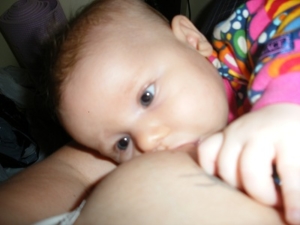
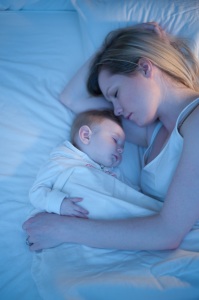

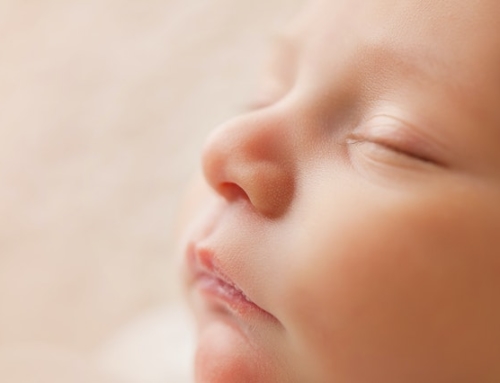

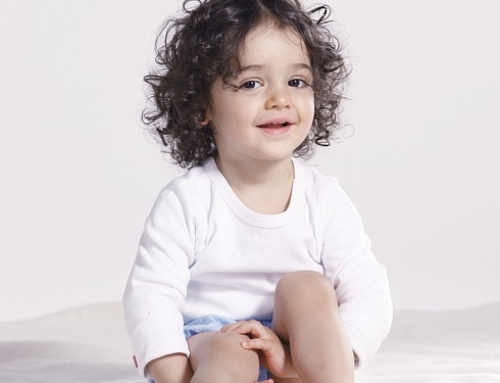
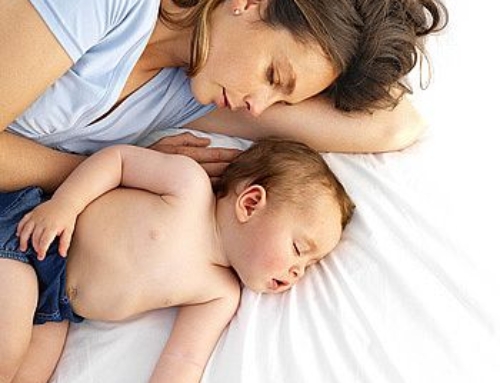
Thank you for this piece. A great discussion of the research.
Thank you for this breakdown, EP. Extremely well written.
Another great article, I will be reading those recommended books.
I just want to add that I live in Denmark and it is common practice to do exctinction cry so the child learns to sleep 🙁
[…] • https://gku.flm.mybluehost.me/evolutionaryparenting.com/toddler-sleep-problems-should-we-be-worried/ […]
Help! My 12 month old is waking 6-7 times a night. Sometimes it’s restless whimpering, most of the time it is crying/screaming. I do co-sleep but nothing soothes him. I took him to the dr to see if he had another ear infection and he didn’t so she suggested sleep training. Stating he doesn’t have self soothing skills. Well I’ve tried it twice and after two hours both times (once’s trying their Ferber method and second time not entering at all) he was found standing at the side, wide awake, crying and waiting for me. I can’t keep doing that! He does have a diary allergy, but not soy. We see an allergist in September and I’m hoping that will give me more answers but I feel like I need to help him in the mean time.
Sent you an email.